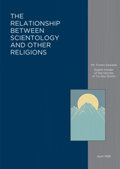The origins of Scientology date back to the 1930s when L. Ron Hubbard, the American who was to become the founder of Scientology, travelled the East and asked himself why man was living such a miserable life. No one had been able to answer his questions, when, as a young man, he had asked where man came from and where man was going.
In 1950, Mr. Hubbard wrote a book on a subject he called Dianetics (“through mind”), which was his early research into the mind. The book, Dianetics: The Modern Science of Mental Health was very popular and soon became a bestseller, and has sold more than 17 million copies. As the Dianetics movement grew and the research expanded from the mind into the spirit, another subject was born—Scientology—and the first Church was founded in 1954 in the United States. Dianetics first entered Japan shortly after that, but the first formal Scientology missionary expansion into Japan occurred in 1962, making this the actual starting point of Scientology’s history in Japan. On 10 September 1962 the first official lecture on Scientology was given to a packed auditorium.
The word “Scientology” comes from the Latin scio, meaning “Knowing in the fullest sense of the word,” and the Greek logos, which means “to study.”
In the book Scientology: The Fundamentals of Thought, Mr. Hubbard explains that the subject is actually descended from the roots of psychology, but that we must understand that it is not descended from current psychology, but rather the older psychology as was taught in the religions of the world before the spiritual essence of the study was removed in the last century.
Psychology means literally “the study of the spirit.” Psychology of today has lost this meaning and no longer studies or recognizes the spirit as a bona fide field of study. In this sense Scientology is very different, as it does study the spirit, as most great religions of the world do.
Religions generally accept that the human spirit is related to the great “life-force” of this universe. However, the word “spirit” is difficult to define. Some would argue that the spirit is in fact the human mind. But in Scientology the term “spirit” would mean “oneself” and it means much more than just the mind. In one Japanese Shinto religion, Seicho-no-Ie, it is expressed as what would be translated into “the child of God.” It would correspond to the Japanese words “hime” or “hiko.” In Scientology, Mr. Hubbard coined the word thetan, from the Greek for spirit, as no other existing word could fully describe it.
Religions generally accept that the human spirit is related to the great “life-force” of this universe. Some would argue that the spirit is in fact the human mind. But in Scientology the term “spirit” would mean “oneself” and it means much more than just the mind.
The concept of coining new words to explain new concepts that have no existing words is not new to religion. In Japan, Master Kobodaishi, the founder of Shingon (a very old and traditional, large esoteric Buddhist sect) coined many words that needed to be developed so that the religion could be practiced.
Yet at the same time there is no new word for God coined in Scientology. Though the framework of God may not be part of the Scientology study, and members may have their own ideas of what this term is or is not, the words used for it are “the Supreme Being,” the “infinite,” “the allness of all,” “the author of the universe,” and of course “God.”
Unlike some other religions, Scientology has no particular dogma about the concept of God, but rather allows the person to develop his own understanding of how he fits into the universe and the nature of things. From there faith may follow. Thus Scientology students not only appear to come from all walks of life and nationalities, but from very diverse religious backgrounds. Being a member of more than one religion is very common in Japan and the East. In this tradition, some Japanese students of Scientology also do not give up their other religions, but from what this writer can understand, have used their study of Scientology to strengthen their previous religious commitment and faith in God. This is slightly similar in concept to what is practiced in the relatively new Shinto religion, Seicho-no-Ie, which also has followers coming from Buddhist, Christian and other faiths.





























